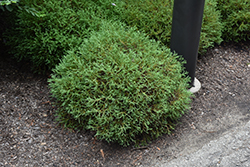It's all about ...
plants

Pancake™ Arborvitae
Thuja occidentalis 'Concesarini'
Height: 12 inches
Spread: 24 inches
Sunlight:
![]()
![]()
Hardiness Zone: 3a
Other Names: Eastern White Cedar
Brand: Monrovia
Description:
As its name implies, this is a finely textured dwarf form with a dense, low, rounded habit; newer green foliage will tint blue in fall and winter; perfect for rock gardens, as a low border, or as a hedge; easy to maintain
Ornamental Features
Pancake™ Arborvitae is a dwarf conifer which is primarily valued in the garden for its interestingly mounded form. It has grayish green evergreen foliage which emerges light green in spring. The tiny scale-like sprays of foliage turn an outstanding powder blue in the fall, which persists throughout the winter.
Landscape Attributes
Pancake™ Arborvitae is a dense multi-stemmed evergreen shrub with a mounded form. It lends an extremely fine and delicate texture to the landscape composition which should be used to full effect.
This is a relatively low maintenance shrub. When pruning is necessary, it is recommended to only trim back the new growth of the current season, other than to remove any dieback. It has no significant negative characteristics.
Pancake™ Arborvitae is recommended for the following landscape applications;
- Accent
- Mass Planting
- Hedges/Screening
- General Garden Use
Planting & Growing
Pancake™ Arborvitae will grow to be about 12 inches tall at maturity, with a spread of 24 inches. It tends to fill out right to the ground and therefore doesn't necessarily require facer plants in front. It grows at a slow rate, and under ideal conditions can be expected to live for approximately 30 years.
This shrub does best in full sun to partial shade. It prefers to grow in average to moist conditions, and shouldn't be allowed to dry out. It is not particular as to soil type or pH. It is somewhat tolerant of urban pollution, and will benefit from being planted in a relatively sheltered location. Consider applying a thick mulch around the root zone in winter to protect it in exposed locations or colder microclimates. This is a selection of a native North American species.
